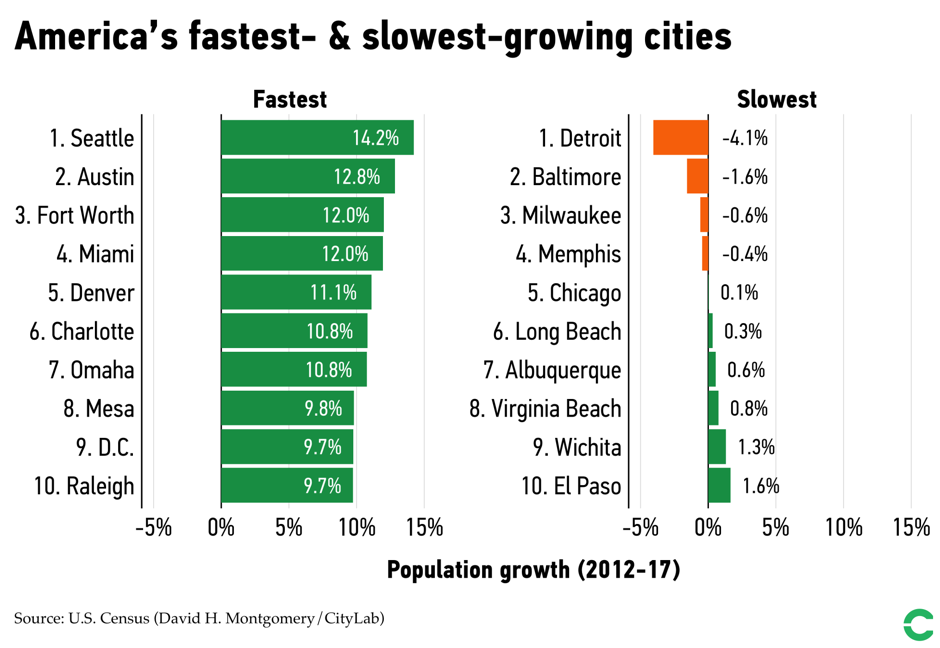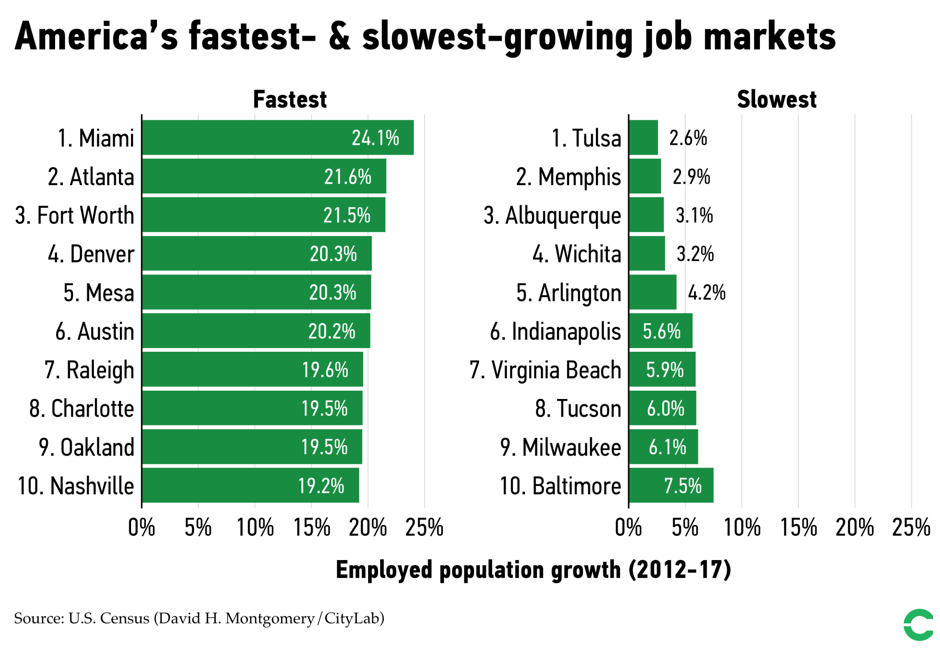| |
 Posted Aug 23, 2019, 6:05 PM
Posted Aug 23, 2019, 6:05 PM
|
 |
Registered User
|
|
Join Date: Aug 2002
Location: Toronto
Posts: 52,200
|
|
|
The Fastest-Growing U.S. Cities Aren’t What You Think
The Fastest-Growing U.S. Cities Aren’t What You Think
AUG 21, 2019
By RICHARD FLORIDA
Read More: https://www.citylab.com/life/2019/08...ata-us/596485/
Quote:
When it comes to the economic status of cities, there is no shortage of conflicting messages—and conflicting facts. On the one hand, we hear about the dominance of superstar cities and tech hubs in the competition for talented workers, high-end knowledge jobs, and high-tech startups. On the other hand, Sunbelt cities continue to lead in the growth of population and jobs in general.
- The reality is that most studies that purport to talk about cities are really talking about the performance of broader metropolitan areas, which are made of up core or principal cities and their surrounding suburbs and exurbs. Looking at cities by themselves is important and useful for several reasons. — For one, there is lots of talk these days about urban revitalization, the comeback of cities, and urban gentrification. But all of this is likely very uneven across U.S. cities, shaped by the same winner-take-all pattern that we see for metro areas. Some cities have bounced back and are experiencing growth in population and jobs, and in key dimensions of talent like college graduates and the creative class. But others continue to struggle and lose ground, whether to other cities or their own suburbs.
- While cities are parts large parts of metro regions, it is not necessarily the case that they closely follow the performance of their metros. Some cities may perform much better, others worse. This series dives into an aspect of contemporary urbanism that has been under-examined, the economic performance of America’s largest cities. To get at this, I worked with a team of researchers to analyze the economic performance of American’s 50 largest core or principal cities over the five-year period of 2012 to 2017. — Economist Todd Gabe crunched the numbers, using the U.S. Census’s American Community Survey to chart cities’ performance on factors including population growth, employment growth, growth in college grads, and the creative class, as well as how they stack up on economic inequality, housing affordability, and other indicators of what I call the “new urban crisis.”
- The overall, broad trend conforms to the popular image of a growing Sunbelt and declining “Frost Belt” of cold-weather cities. However, the most rapidly growing large cities are not sprawling, unregulated Sunbelt ones (such as Houston), but two relatively expensive tech hubs, anchored by leading research universities Seattle and Austin. Denver, Washington, D.C., and Raleigh also make the top 10. Miami comes fourth, and Fort Worth, Charlotte, Mesa, Arizona, and Omaha round out the list. — Nashville, which ranks first among metros with 15.7 percent growth, scrapes only 24th on the cities list, with 6.9 percent growth. Dallas comes seventh for metros (11.3 percent growth), but 15th for cities (8.1 percent growth). Houston ranks eighth for metros but 23rd for cities; Las Vegas, tenth for metros and 16th for cities. Two Midwest metros, Columbus and Indianapolis, but not those cities proper rank among the top 10 for population growth.
- Leading tech hubs and superstar cities actually appear far down the growing-cities list. Boston is 21st and and San Francisco 22nd, both with around 7 percent growth. L.A. is 34th, with 3.7 percent growth; New York, 35th, with 3.4 percent growth. When it comes to slow-growing cities (the right side of the chart), Detroit, Baltimore, Milwaukee, and Memphis have lost population; Chicago has barely held constant. Southern and Western cities round out this group: Long Beach, California, Albuquerque, Virginia Beach, Wichita, and El Paso. There is more overlap between declining cities and declining metros. Detroit, Chicago, Milwaukee, and Memphis show up on both lists. The slow-growing cities of St. Louis, Buffalo, and Cleveland also show up on the list of the 10 slowest-growing metros.
- There is significant overlap between this fastest-growing list and metros with the fastest job growth. Five places rank in the top 10 on both: Atlanta, Nashville, Austin, Raleigh, and Denver. (Charlotte would, too, if we did not exclude it because of changes to its metro boundaries.) A number of Sunbelt cities appear further down the fastest-growing cities list: Las Vegas at 12th; Dallas at 20th; Houston at 40th. — Again, superstar cities and leading tech hubs appear very low here. New York is 36th, with 9.1 percent growth. (Detroit actually does better, ranking 28th with 13.7 percent growth.) L.A. is 26th with 14 percent growth; Boston is 23rd (15 percent), and San Francisco is 15th (17 percent).
- The slowest-growing cities for jobs (above right) are a mixed bag, with some interesting contrasts. Milwaukee is the only canonical Rust Belt city to make the list, in ninth place. Memphis is second and Baltimore, which is often lumped in with the Rust Belt but is on the East Coast’s Acela Corridor, is tenth. — Tulsa tops the slow list what’s interesting about that is that nearby Oklahoma City is one of the nation’s fastest-growing cities in terms of population. Likewise, Arlington, Texas, has the fourth-slowest job growth; compare this to nearby Fort Worth, with the third-best job growth. Indianapolis, typically thought of alongside Columbus as a success story, actually numbers among the 10 slowest cities on job growth, as do Tucson and Virginia Beach in the Sunbelt.
.....
|


__________________
ASDFGHJK
|
|
|



